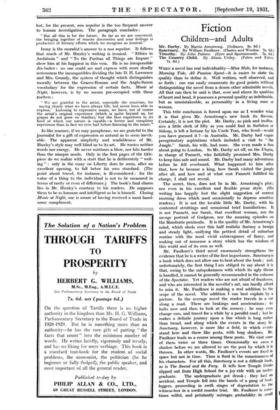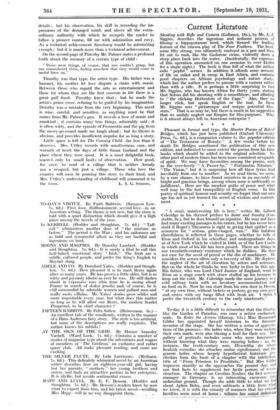Fiction
Children—and Adults
7s. 6d.)
WHEN a novel has real individuality—Miss Mole, for instance, Morning Tide, All Passion. Spent—it is easier to state the quality than to define it. Well written, well observed, and so forth : one can easily enumerate its good points without distinguishing the novel from a dozen other admirable novels. All that can then be said is that, over and above its.qualities of heart and head, it possesses a personal quality as indefinable, but as unmistakeable, as personality in a living man or woman.
This trite conclusion is forced upon me as I wonder what it is that gives Mr. Armstrong's new book its flavour. Certainly, it is not the plot. Mr. Darby, as pink and inoffen- sive a little clerk of fifty as you could find in Surbiton or Sidcup, is left a fortune by his Uncle Tom, who lived—would you have guessed it ?—in Australia. Mr. Darby had vague peregrinatory aspirations which included a visit to " the Jungle." Sarah, his wife, had none. She even made a fuss about going to London. So Mr. Darby set off, on the Utopia, in charge of Punnett, who faithfully promised Mrs. Darby to keep him safe and sound. Mr. Darby had many adventures before he fell overboard. What happened to him after that, how he became a king, how Sarah visited the jungle after all, and how and at what cost Punnett fulfilled his charge, I shall not reveal.
The secret, then, does not lie in Mr. Armstrong's plot ; nor even in his excellent and flexible prose style. (His writing has happily lost the slight suggestion of correct morning dress which used occasionally to depress sensitive readers.) It is not the lovable little Mr. Darby, with his contented struttings and occasional brief humiliations. It is not Punnett, nor Sarah, that excellent woman, nor the savage portrait of Gudgeon, nor the amazing episodes on the Mandratic peninsula. It is the quality of Mr. Armstrong's mind, which sheds over this half realistic fantasy a benign and steady light, unifying the pettiest detail of suburban routine with the most vivid extravagance of fancy, and making out of nonsense a story which has the wisdom of this world and of its own as well.
Mr. Faulkner's third novel enormously strengthens the evidence that he is a writer of the first importance. Sanctuary is a book which does not allow one to beat about the bush ; and, unfortunately, the first thing I am obliged to say about it is that, owing to the outspokenness with which its ugly theme is handled, it cannot be generally recommended in the columns of the Spectator. Yet readers who are not afraid of frankness, and who are interested in the novelist's art, can hardly afford to miss it. Mr. Faulkner is making a real addition to the scope of the novel. The addition I can best explain by a picture. In the average novel the reader travels in a car along a road. There are brakings and accelerations ; he halts now and then to look at the scenery ; he may even change cars, and travel for a while by a parallel road ; but he makes a definite journey upon a line which is long rather than broad, and along which the events in the story lie. Sanctuary, however, is more like a field, in which events stand here and there like posts, with long shadows. Mr. Faulkner leads us a course among these posts. We visit some of them twice or three times. Occasionally we cross a shadow before we are allowed to see the post by which it is thrown. In other words, Mr. Faulkner's events are fixed in space but not in time. Time is fluid in the consciousness of his characters. For all this, Sanctuary is not a difficult book, as is The Sound and the Fury. It tells how Temple Drake slipped out from High School for a joy-ride with an under- graduate. The undergraduate got drunk ; they had an accident, and Temple fell into the hands of a gang of boot- leggers, proceeding in swift stages of degradation to the witness-box in a sordid murder trial. Mr. Faulkner is some times wilful, and petulantly outrages .probability: in small details ; but his observation, his skill in recording the im- pressions of the deranged mind, and above all the extra- ordinary authority with which he compels the reader to follow a pioneer course, fill me with admiration and envy, As a technical achievement Sanctuary would be astonishing cnough ; but it is much more than a technical achievement.
On the second page of Timothy Mr. Palmer states a profound truth about the memory of a certain type of child :
" There were things, of course, that one couldn't grasp, but one remembered them, feeling somehow that they would come in useful later on."
Timothy was that type, the artist type. His father was a baronet, his mother let love dispute a claim with music. Between those who regard the arts as entertainment and those for whom they are the first concern in life there is a great gulf fixed. Timothy knew that ; but he made the artist's prime error, refusing to be guided by his imagination. Dorothy was a mistake from the very beginning. This novel is wise, careful, and sensitive, as anything must be that comes from Mr. Palmer's pen. It reveals a love of music and mankind ; it contains many true things, admirably said ; it is often witty, and the episode of Fromentin and the pig from the merry-go-round made me laugh aloud ; but its theine is obvious, and provides insufficient impulse for so long a story.
Little space is left for The Country Child—far less than it deserves. Mrs. Uttley records with sensitiveness, care, and warmth of heart the days of little Susan Garland and the place where they were spent. It is a most delightful book, marred only by small faults of observation. How good, for once, to read of a village that is neither Arcady nor a cesspool, but just a village. Those who love the country will soon be praising this story to their kind, and Mrs. Uttley's understanding of childhood will commend it to



































 Previous page
Previous page